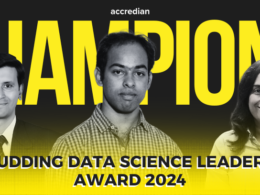At Accredian, we create accomplished and empowered Data Leaders. We groom our students to dominate the world of Data Science and Artificial Intelligence and reshape their future. We value what our students bring to the table. We share their vision and support them during their journey and ensure that they carve a niche for themselves.
We’re proud to have tutored exceptional students all across India. Today, one such exceptional student, Sajit Jose stands in the spotlight.
Student Name: Sajit Jose
Batch: GCD – October 2018
Total years of experience: 29 years
Area of expertise: IT solutions
Malvika: Hi Sajit, thank you for joining us, Can you start off the interview by telling us about your professional journey so far?
Sajit: Yeah, sure. I have 29 years of experience. I started at the age of 17 with the Indian Air Force. I worked there for 16 years and was also associated with the IT aspect of Air Force.
From June 2006, since the last 12 years, I’ve been working with Accenture. Currently I’m working as a Project Manager in Accenture. I started off working with databases, Foxpro and then I moved on to Oracle (1999) around the time we had the Y2K bug issues.
That’s when they decided on data migration and I was involved in a team that was doing systems study and converting all the systems to Oracle. Currently, in my role at Accenture, as a Project Manager I have worked in different projects; Development projects, Application Support projects in technology-agnostic software development.
Malvika: You have a very rich experience! What got you interested in Data Science and Machine Learning?
Sajit: I follow the latest trends in technology. I get attracted to new technologies, As part of that I’ve looked into a little bit of artificial intelligence; at what is happening on blockchain. Data Science is something which I know is really upcoming.
Today in Data Science, we’re at the beginning of a trough. So I feel that now is the right time and place and also given my vast experience in data migration, I find that this would be a great place where I want to be in the next few years.
So my interest in it coupled with where the industry is headed is the reason I decided to transition here.
Malvika: You spoke about a trough forming in Data Science. How do you think data science has evolved?
Sajit: Every time there is any new technology, we see a trough getting formed. So it starts like a small bump which is the head, and then there is a big, body portion formed when the commercial space actually adopts the technology. I see a lot of potential but we’re still in the infant stage.
A lot of my clients insist on using chatbots for their businesses, but they would want to test and implement that first with their employees. This is the phase the industry is in. I’m fully convinced all of these machine learning applications are going to go big in the coming years but right now the technology is still in the trough phase.
Malvika: That’s an interesting analogy! What do you think is the goal of Data Science?
Sajit: When talking about goal of Data Science, we need some context. I come from an old era of computerization where I’ve worked with a 20 MB hard drive which is built to perform all the functions of a small organization.
Storage was a big challenge. But today, that is not a challenge. Computation is also not a big challenge today. We have a lot of potential to process our data and a lot of meaningful insights have been going waste. So I feel the goal of Data Science is to really utilize that large amount of data and remove inefficiencies.
In governmental set-ups, efficiency would mean saving; saving translates into distribution to a lot more people. When I look at it holistically, the goal of data science is utilizing patterns and optimizing at a capability that we didn’t have till now.
Malvika: Sajit, what are some current trends in the Data Science or Artificial Intelligence space that you’re excited about?
Sajit: Most of my clients are service-based as I come from an application support background. So when we get into a contract, we’re supposed to support all of the client’s applications. Imagine a space where we have all these tickets in place, and then we introduce the required analytics which help us decide which of these tickets need manual inputs and which of them could be automated. These are actionable insights.
Using machine learning, chatbots, alert bots, automatic calling services, we have been able to automate a large chunk of them.
So I’m really excited that in my field, a lot of things are happening. I see great potential in optimizing services by roping in data science and analytics. Tools like Splunk are forcing us to do that more because they build live data of their infrastructure every second. That can be in the form of a dashboard and even senior-level employees can have a look at it, see what is happening every minute and that creates a backward process answering the big question- what are we doing with that data.
Malvika: Sajit, given the experience you have, you must have seen the evolution and progress of a lot of languages. Could you talk to me about your experience with Python?
Sajit: Honestly, I took a dive into Python with the help of Accredian. Despite having a really hectic professional life, I devoted time to Python and developed an interest very soon. In fact, I’ve explored multiple levels of HackerRank for Python.
Secondly, because I have a programming background it was easy for me to pick up Python faster. Packages were introduced by people who have a great experience in the field; it’s not so much about understanding why they were developed but about saving time. It is a very popular language and machine learning algorithm friendly.
The main strength of Python is the large community that it has evolved with. This community is helping develop the language and adds more and more features which means that any area of industry can have their own reusable packages.
Malvika: Accredian’s mission is to groom Data Leaders of tomorrow. Could you help me understand what data leaders are and how they’re different from data scientists?
Sajit: Data science is the branch for analytics and data scientists are people who have the skills to do that. When we talk about Data Leaders, we’re talking about game-changers. All industries and lines of work are going through changes.
When changes happen you need leaders to pushing ahead through. So, I feel that Data Leader is someone who can influence, who can be a visionary; he’s not only farsighted, he also coaches and leads people, institutions and companies in gearing up for Data Science and the changes that it’ll bring. A Data Leader should be able to make a difference in different industries or social ventures.
Malvika: Crafting a great Data Science resume is a critical part of getting shortlisted for Data Science roles. Tell us some ways in which you have improved your resume as part of the Data Science Career Launchpad.
Sajit: The session was very useful.
Honestly, I touched my resume after 10 years, because I’ve been working in my current company for 12 years! That session conveyed some good tips because my skills in resume building were 10 years behind!
Even though, I conduct interviews and assess resumes in my current organization, these tricks did help me understand why somebody would be interested in continuing to look through my resume, what makes somebody discard it; how do you structure your resume? What should recruiters look at? What are they looking for? What should you avoid in your resume? These were some crucial tips discussed during those sessions.
Malvika: At Accredian, students are encouraged to build high quality Github profiles. Have you built a Github portfolio and how do you think this will help you?
Sajit: As someone in the open job market, when I look at my peers, the latest trend is about how somebody is exposing their profile to the world. Github is a strong tool or platform for it. An extensive Github profile, a lean resume and a strong community is essential in creating a professional identity.
Having a professional identity is a must for you to be more diverse, different, and critical in projecting yourself to the recruiters. It is essential for all of us to take these steps to get noticed in the job market.
Malvika: Sajit, are there any Data Science and Artificial Intelligence influencers that you follow?
Sajit: I follow Soumith Chintala. He contributes in Facebook AI Research. In data science, I follow Kirk Borne and Martin Wattenberg. Martin is accredited with FlowingData. I also follow KDnuggets and Towardsdatascience that were recommended by Manav in one of the sessions.
Malvika: What were some initial challenges that you faced when you started off on this journey?
Sajit: Some initial challenges were like learning Python from scratch.
Also, I had to brush up on statistics because I had studied statistics and mathematics like 20 years ago. I had some help with the domains because I worked in multiple industries but that is not enough, you really need to know your domain much more better.
So those were the challenges. Through reading, through learning, through keeping abreast with blogs, through practicing Python on Hackerrank I was able to equip myself better.
Malvika: Lastly Sajit, do you have any advice for a newbie who was starting out in the in the data science field?
Sajit: I would say that it is a great field to be exposed to because we all know that none of us can escape computers and information technology anymore. Similarly, in the future, none of us will be able to escape analytics and data science either. I think my first piece of advice would be to develop critical thinking. Find and seek the right questions a great free to use your time.
Malvika: Thank You, Sajit! This has been very informative. On behalf of our team at Accredian, we wish you Good Luck for the future!





